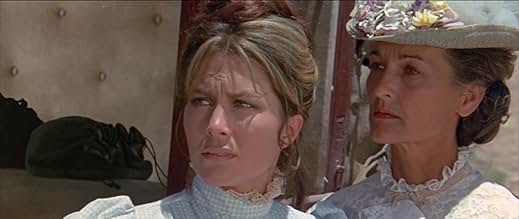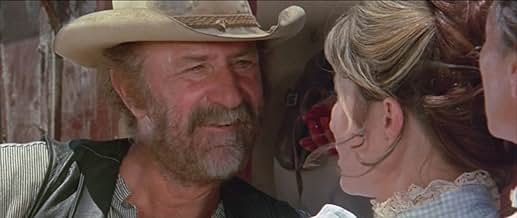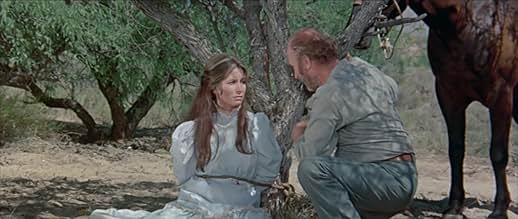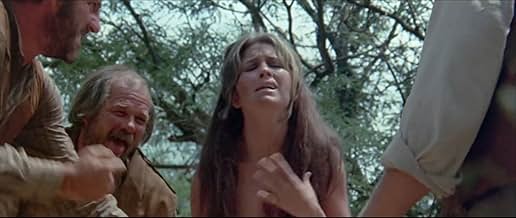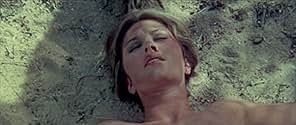A woman tracks down the five men who raped her, helped by an Apache.A woman tracks down the five men who raped her, helped by an Apache.A woman tracks down the five men who raped her, helped by an Apache.
Joe Turkel
- Peyote
- (as Joseph Turkel)
William Bryant
- Sheriff Martin Lord
- (as Bill Bryant)
Steve 'Bunker' de France
- Tucson Deputy
- (as Steve Michel De France)
- Director
- Writer
- All cast & crew
- Production, box office & more at IMDbPro
Featured reviews
This would-be "with-it" revenge story in Western garb is notable only for having a female protagonist thus anticipating the cult item HANNIE CAULDER (1971). Still, Michele Carey's terrible central performance and her squeaky voice basically sink the film entirely as she projects little emotional scars from her ordeal; in fact, she seems to get back into a happy mood way too soon after her rape! The sadistic cast of characters are led by notorious bandit Keenan Wynn and Henry Silva is surprisingly cast as the Apache good guy who helps Carey carry out her retribution (interestingly, he had previously appeared in a similar - and much superior - tale, THE BRAVADOS [1958]). Another nail in the film's coffin is the sheer poverty of the direction which generates no suspense whatsoever as Silva and Carey are merely seen to effortlessly stumble upon each of the rapists' new hideout, kill them off without much ado and exit the scene; add to that the puerile fast-cutting technique employed intermittently which grows tiresome before too long. The trebly ironic ending, then, is a valiant attempt at resurrecting the movie but by then it is too late and only a fairly decent score saves the whole thing from a BOMB rating.
...this might have been a decent western. The story, of a school teacher captured, raped and left for dead by thugs, whose then saved by a lone Apache she forms a bond with is nothing new. And neither is this rather dull movie. The ending is entirely predictable (again, in the hands of a more imaginative director, perhaps this would have been avoided). The saving grace is the beautiful Michele Carey, who actually shows some skin and Henry Silva as the Apache, Chatto. Keenan Wynn is surprisingly good as the lead villain, but the set ups are almost bad enough to be TV westerns and again, the story fails in the end.
5JHC3
Schoolteacher Alice McAndew (Carey) has the misfortune of sharing a stagecoach with prisoner Pudge Elliott (Wynn). When Pudge's friends arrive to rescue him, they don't stop at simply robbing the stage. All aboard are killed except Alice. Her intended fate is far worse. She is hauled into the desert to be repeatedly and brutally raped and left for dead.
The outlaws' plan goes awry when an Apache (Silva) saves Alice from a cruel death from shock and dehydration. He nurses the young woman back to health. Before long, the two start hunting down the killers.
By 1970 standards, this is a fairly extreme western. The rape scene is not lingered on, but is filmed in such a way as to instill shock in the viewer. The film has a few rare humorous elements, but is otherwise a deadly serious tale of revenge. Henry Silva's character has little dialogue and virtually no knowledge of English. The filmmakers rely instead on imagery and expressions to tell the story more than the spoken language.
For me, the film was passable. I personally couldn't find much to fault in the approach taken. Some plot elements are strong, but cannot be stated here without becoming spoilers. The cast is good and consists largely of veterans of the western genre. The minimal dialogue was a good choice. The rape scene is not exploitative. Perhaps it is because this vengeance theme has been done so much that I couldn't really get into the film. For western traditionalists, this might be one to avoid.
The outlaws' plan goes awry when an Apache (Silva) saves Alice from a cruel death from shock and dehydration. He nurses the young woman back to health. Before long, the two start hunting down the killers.
By 1970 standards, this is a fairly extreme western. The rape scene is not lingered on, but is filmed in such a way as to instill shock in the viewer. The film has a few rare humorous elements, but is otherwise a deadly serious tale of revenge. Henry Silva's character has little dialogue and virtually no knowledge of English. The filmmakers rely instead on imagery and expressions to tell the story more than the spoken language.
For me, the film was passable. I personally couldn't find much to fault in the approach taken. Some plot elements are strong, but cannot be stated here without becoming spoilers. The cast is good and consists largely of veterans of the western genre. The minimal dialogue was a good choice. The rape scene is not exploitative. Perhaps it is because this vengeance theme has been done so much that I couldn't really get into the film. For western traditionalists, this might be one to avoid.
A young lady is manhandled after a stagecoach robbery in Arizona and left for dead (Carey), but a solitary Apache patiently sees to her restoration (Silva). They eventually team-up to pursue justice. John Anderson plays the righteous lawman that heads the posse while Keenan Wynn is on hand as the leader of the thug scum.
"The Animals" (1970), also known as "Five Savage Men," is an obscure 'B' Western that was the blueprint for "Hannie Caulder" (1971) and "I Spit on Your Grave" (1978). Michele was 27 during shooting and one of the most beautiful women on earth at the time. You might remember her from "El Dorado" (1966), "Live a Little, Love a Little" (1968) and "Dirty Dingus Magee" (1970).
The score was written by Rupert Holmes, known for his hit "Escape (The Pina Colada Song)." It starts out dubious because it's mod-ish and seemingly unfitting for a movie that takes place in the Old West, but other Westerns had already set this precedent in the 60s. Thankfully, the music improves with some parts featuring notable percussive pieces and others that are moving.
Most of the reviews are pretty low, but I'm sure this is due to the lousy first impression of the score and other technical deficiencies of what is likely the only print available. Sure, it's low budget and reminiscent in tone of the contemporaneous "Cry Blood, Apache," but it's superior to that barbaric and dismal revenge yarn.
For instance, it's more than just a brutal crime/revenge flick as the center of the story focuses on a noble 'savage' who contrasts the five Caucasian savages from the first act. He develops a successful cross-cultural relationship with the white woman back when it was socially unacceptable on either side. For anyone who argues that this is unrealistic, Apache men back then were people just like you and me today. They weren't all cookie-cutter. One or two here and there were more individualistic compared to the typical brave and could even be viewed as outcasts. That seems to be the case here.
The last act switches to the expected vengeance à la "Hang 'Em High" (1968), but the climax is surprising, offering a lesson on how even a noble individual can grossly misjudge another person (or people) & situation, and actually commit a crime. That's why the bible advises not judging until enough accurate info is acquired to make a just assessment; and, even then, you have to be careful.
There are unexpected creative bits as well, like the well-done Apache stare-down sequence and the fistfight over the saloon lass in the street.
I also disagree that "The Animals" can be written off as a rip-off of Spaghetti Westerns. It's an American production shot completely in Arizona and I could cite numerous American Westerns as influential. Don't think for a second that Sergio Leone's "Man With No Name" trilogy was wholly original. For instance, Ennio Morricone's score for "A Fistful of Dollars" features a moving piece glaringly inspired by Dimitri Tiomkin's outstanding "El Degüello" from "Rio Bravo" (1959).
Lastly, unlike the typical Italian Western caricatures, this flick provides actual characters. The core relationship is actually touching and so the flick scores well in the human interest department.
The film runs 1 hour, 26 minutes, and was shot in Arizona, e.g. Saguaro National Park, Old Tucson, Sonoran Desert, Sierrita Mountains and Santa Cruz River.
GRADE: B.
"The Animals" (1970), also known as "Five Savage Men," is an obscure 'B' Western that was the blueprint for "Hannie Caulder" (1971) and "I Spit on Your Grave" (1978). Michele was 27 during shooting and one of the most beautiful women on earth at the time. You might remember her from "El Dorado" (1966), "Live a Little, Love a Little" (1968) and "Dirty Dingus Magee" (1970).
The score was written by Rupert Holmes, known for his hit "Escape (The Pina Colada Song)." It starts out dubious because it's mod-ish and seemingly unfitting for a movie that takes place in the Old West, but other Westerns had already set this precedent in the 60s. Thankfully, the music improves with some parts featuring notable percussive pieces and others that are moving.
Most of the reviews are pretty low, but I'm sure this is due to the lousy first impression of the score and other technical deficiencies of what is likely the only print available. Sure, it's low budget and reminiscent in tone of the contemporaneous "Cry Blood, Apache," but it's superior to that barbaric and dismal revenge yarn.
For instance, it's more than just a brutal crime/revenge flick as the center of the story focuses on a noble 'savage' who contrasts the five Caucasian savages from the first act. He develops a successful cross-cultural relationship with the white woman back when it was socially unacceptable on either side. For anyone who argues that this is unrealistic, Apache men back then were people just like you and me today. They weren't all cookie-cutter. One or two here and there were more individualistic compared to the typical brave and could even be viewed as outcasts. That seems to be the case here.
The last act switches to the expected vengeance à la "Hang 'Em High" (1968), but the climax is surprising, offering a lesson on how even a noble individual can grossly misjudge another person (or people) & situation, and actually commit a crime. That's why the bible advises not judging until enough accurate info is acquired to make a just assessment; and, even then, you have to be careful.
There are unexpected creative bits as well, like the well-done Apache stare-down sequence and the fistfight over the saloon lass in the street.
I also disagree that "The Animals" can be written off as a rip-off of Spaghetti Westerns. It's an American production shot completely in Arizona and I could cite numerous American Westerns as influential. Don't think for a second that Sergio Leone's "Man With No Name" trilogy was wholly original. For instance, Ennio Morricone's score for "A Fistful of Dollars" features a moving piece glaringly inspired by Dimitri Tiomkin's outstanding "El Degüello" from "Rio Bravo" (1959).
Lastly, unlike the typical Italian Western caricatures, this flick provides actual characters. The core relationship is actually touching and so the flick scores well in the human interest department.
The film runs 1 hour, 26 minutes, and was shot in Arizona, e.g. Saguaro National Park, Old Tucson, Sonoran Desert, Sierrita Mountains and Santa Cruz River.
GRADE: B.
Was generous with a 4 rating. Interesting scenery. Poor directing. Questionable if editing was bad or that was all they had to work with. Silva is virtually mute so writers weren't necessary.
Did you know
- TriviaOnly career nude scene for Michele Carey.
- Quotes
Posseman #1: Allan! Allan! Pieces of a woman's dress... stakes...
Sheriff Allan Pierce: Stripped her down... Stripped her down and tied her up... sons of bitches!
- ConnectionsFeatured in 42nd Street Forever! Volume 1: Horror on 42nd Street (2004)
- How long is The Animals?Powered by Alexa
Details
- Release date
- Country of origin
- Language
- Also known as
- La vengeance de l'apache
- Filming locations
- Production company
- See more company credits at IMDbPro
- Runtime1 hour 26 minutes
- Sound mix
- Aspect ratio
- 2.35 : 1
Contribute to this page
Suggest an edit or add missing content


